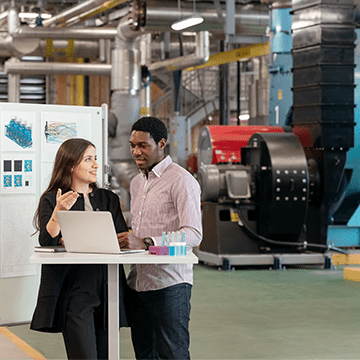A program that is at the nexus of discovery and deployment

Sustainable Process Engineering: Industry Challenges
By Vikram Yadav, Director of the MEL in Sustainable Process Engineering
The chemical industry depends on innovations. It needs ideas – for better products, processes and technologies that are economically and environmentally sustainable. The innovative ideas that will drive these changes will be generated by intensely curious individuals who are stimulated by solving problems and who have the entrepreneurial mindset needed to make their solutions a reality.
Addressing these two challenges – the chemical industry’s need for both innovations and innovative people – is at the heart of the Master of Engineering Leadership in Sustainable Process Engineering program.
We anticipate that our first graduates will catalyze change either from within major organizations or by creating their own entrepreneurial ventures.
There are many opportunities to transform and rethink current chemical industrial practices. The chemical industry is one of the largest economic engines in our world, producing medicines, materials, fuels and thousands of value-added products used in virtually every sphere. Such a large industry does, by its nature, have a large footprint. Starting in the 1960s – and spurred by the 1962 publication of Rachel Carson’s Silent Spring that outlined the widespread negative impacts of pesticide use – the chemical industry began being much more deliberate about making processes more efficient and minimizing their impact. Countless studies since then have shown us that what is good for the environment is good for business.
The articulation and advancement of the 12 Principles of Green Chemistry represent an understanding that our planet is, in fact, a closed-loop system, and that we need to rethink many traditional practices.
In many respects, these principles are just common sense: use safer solvents and better catalysts, design for energy efficiency, aim to incorporate all materials used in the process into the final product. Implementing these principles does, however, require innovation.
Our students are stimulated by solving problems and rethinking the status quo. They’re the innovation entrepreneurs who thrive on being intimately involved with the technical problem-solving side of their work – rather than those, for example, who seek advancement on the management side and are happy to step away from technical issues. Our students define themselves through their commitment to innovation and technology, as well as their desire to be sustainability leaders and have a positive impact on the world.
However, the most innovative ideas will not make a difference if they are not implemented. This underlines the importance of ensuring people have not only the in-depth technical knowledge needed to come up with new ways of doing things, but that they also have the business and leadership skills to make a business case, understand the practical issues of deployment and scaling-up, and inspire others to reach for the same ambitious goals. This program, with its combination of graduate-level engineering classes and business courses, does just that. Students who come to UBC will also find that the university is a world leader in sustainable research. The innovation ecosystem that spreads out from campus into the city, province and country means that industry players are often more willing to apply innovations than those in other jurisdictions. Yes, industry can always do more and do it better. But it has shown willingness to develop and adopt green technologies. For our students, there’s no better place to be: not only are you supported to generate new ideas, but it’s likely you’ll have a shot at putting them into practice.
Featured Faculty and Staff

DR. VIKRAM YADAV
Sustainable Process Engineering
Translate innovations in green chemistry and sustainable manufacturing into entrepreneurial ventures.
Read More
